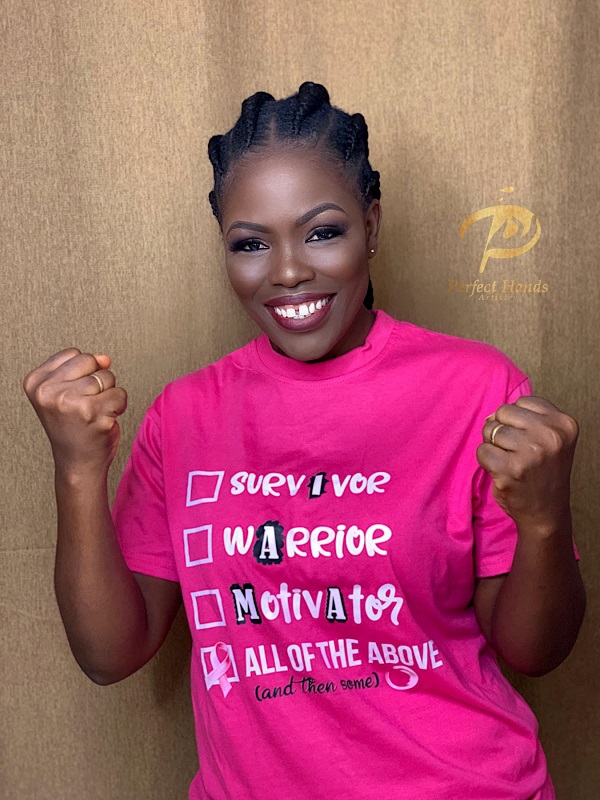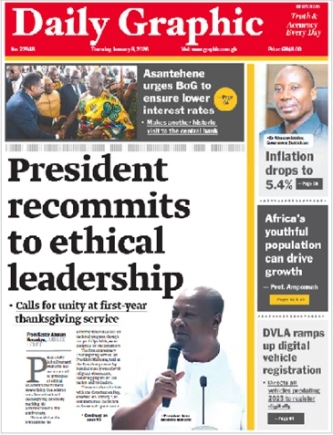Lifestyle News: Fashion, Health, Relationships & More | The Mirror - Graphic Online

I found purpose in pain - 35-year-old breast cancer survivor
Since she had just ended breastfeeding, she assumed the pain was a usual breast engorgement that happens to most women after weaning their babies.
After examining herself, she felt a lump in the breast and started different home treatment methods but it wouldn’t stop.
According to her, she tried massaging with warm water, shea butter, “holy water” and even “anointing oil” — just in case the pain was a “spiritual attack”.
Three months down the line, the pain only increased and the lump grew bigger. It was at this stage that she decided to visit a private health facility near home for further assessment.
“To be honest with you, I had heard of breast cancer but I never paid attention to it or thought the pain and lump in my breast could be cancer. I was only 30, I had breastfed three other children and this was my fourth child. I had heard that breastfeeding even reduced the risk so it never crossed my mind to check for cancer,” Gina, as she prefers to be called, told The Mirror in an interview last Wednesday.
At the health facility, an ultrasound scan showed no abnormalities. The doctor at the facility was surprised the test result was normal and requested another scan which also produced the same results.
She recounted that she was given antibiotics and advised to monitor the breast for changes in colour, discharge or sores.
![]()
Mrs Kumah-Dzagah at one of her chemotherapy sessions in 2019
“I could tell from his facial expression that he was worried and not convinced about the results from the scan and that was the awakening moment for me. That was what triggered me to start reading about what changes in breast could mean,” she said.
Gina spent the following days reading everything she saw on the Internet about breast cancer and decided to seek a second opinion. There, she told the team she had done two earlier tests which showed nothing so she was prepared to do other tests available.
She said the doctor discounted her claims, explaining that tumours in the breast rarely came with pain and moreover, she was only 30.
She was referred to a specialist who requested an ultrasound scan and a mammogram (an X-ray image of your breasts used to screen for breast cancer). The specialist explained that although mammogram was ideal for women 40 and over, he wanted to compare both so he wouldn’t miss any sign.
Surprisingly, the mammogram showed no trace of cancer. It was the third ultrasound scan that picked some abnormalities.
![]()
Gina on admission after her mastectomy, a surgery to remove her right breast
To ascertain the state of the abnormality, she followed up with a biopsy —extraction of sample cells or tissues for examination to determine the presence or extent of a disease — which indicated that the breast abnormality was benign (not cancer).
“The waiting period between the tests was traumatic. I had read a lot about breast cancer so I knew the biopsy could give the final verdict. When the results came, I was relieved.
“So initially he advised that we only remove the lump. Three days later, he called explaining that he wanted us to repeat the biopsy as he wasn’t convinced with the results. I was skeptical because the process is painful but he explained that from experience, such changes in the breast could be cancerous so he wanted to be sure not to miss anything at the initial stages,” she said.
Gina went for another biopsy at a different facility and this time, it showed cancer and the beginning of her painful, financially and emotionally draining journey.
Advocacy
Currently, she is on remission, a medical term used to describe when the signs and symptoms of cancer have gone down or gone away and from 2019 till date, has actively shared her story and experiences to encourage people going through breast cancer.
![]()
Gina had to shave her hair during chemotherapy due to constant shedding
After her diagnosis in 2017, she spent two years in and out of the hospital for different treatment methods to remove the affected breast, go through chemotherapy and other procedures.
She said during treatment, she decided that if she was successful, she would share her journey to encourage others and support them through treatment, adding that “it is not an easy journey. Personally, I struggled to accept that my breast had to be removed. I had heard stories of alternative ways to cure cancer, which included changing my diet or using herbal medicines, but the doctor had a long conversation with me. He showed me pictures of women who rejected surgery in the early stages and how their conditions deteriorated. I knew I had no option after seeing those images”.
![]()
Throughout this month, Mrs Kumah-Dzagah hopes to share about 1000 of these breast enhancer pads to survivors across the country
Gina said even though she had the support of her husband and family, she went through several months of emotional turmoil. Chemotherapy also came with many side effects and her inability to be with her children broke her down.
Prior to being diagnosed, she and her husband run a private basic school but they had to close it down in 2020 as their absence affected the running of the school. They had also used most of their savings for treatment.
“Cancer completely changes your life and I understood how it felt, so even before I was discharged I started encouraging people who were freshly diagnosed. I met two other ladies who were also in their 30s and we agreed that after our treatment, we would start a foundation to raise funds to support people going through cancer and create awareness. Unfortunately, they didn’t survive so I started the foundation in their honour,” she said.
In 2019, she started volunteering at the Breast Cancer Unit of the Korle Bu Teaching Hospital as a “face of survivor” who shared her experiences and even showed her scars to women who doubted she had been through that journey or were scared of going through surgery.
When the Breast Society of Ghana realised the impact of her work, they engaged her as a patient navigator and she is actively involved in counselling, follow-ups and the treatment journey.
![]()
She embarks on advocacy in schools, churches and other organisations
She is also the Executive Secretary of the Breast Society of Ghana and leads a number of advocacy events on breast cancer.
Gina founded the Flames of Hope Foundation and embarks on advocacy campaigns in schools, churches and other organisations.
She told this reporter that although she could afford a reconstruction of her right breast, she decided to keep the scars to show to the women she reached out to so they would know she spoke from a real-life experience.
“I have a personal assignment that any woman who goes out of theatre gets a gift waiting to put at the affected breast so they are not too worried about how others will look at them. Breast prostheses is expensive and not all people can afford them after the surgery, so I sew these ones (removing hers), which I wear myself, and give them out to women who come out of surgery,” she explained.
Gina noted that the only way to detect breast cancer early was through regular self-examination and, therefore, advised women particularly to do that often.
“I was fortunate to feel some pain at the early stages but for most people, the pain only comes when the cancer has spread. Throughout this month, there are many free screening exercises happening across the country. Let’s take advantage of them and let’s learn to also do a self-examination each month after our menses,” she said.
Writer's email: Efiaamoakoa2@gmail.com

 Click the link to read your copy.
Click the link to read your copy.